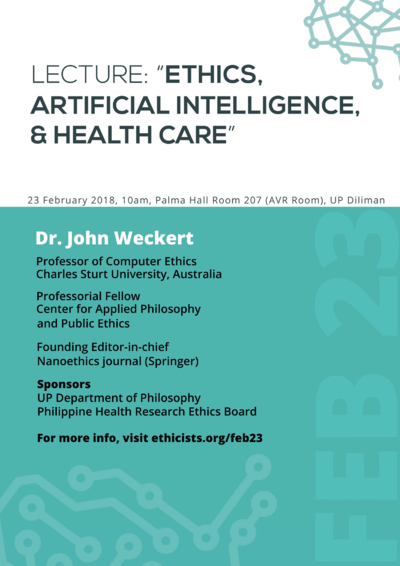Ethics Artificial Intelligence Healthcare: Difference between revisions
No edit summary |
|||
| Line 32: | Line 32: | ||
===Abstract=== | ===Abstract=== | ||
Artificial Intelligence (AI) is much in the news, with many claiming that it will have a great effect on our lives in the future, much more than it is already having. Thirty to forty years ago (and even more), similar claims were being made. Already back then a number of medical systems had been developed, so enthusiasm about the benefits of AI in health care and other areas is not new. Computer technology however has developed considerably since those early days and now the potential of AI in many fields, including in health care, is way beyond anything remotely possible in the past. New technologies often raise ethical issues in new ways and some of these will be explored in this talk. | Artificial Intelligence (AI) is much in the news, with many claiming that it will have a great effect on our lives in the future, much more than it is already having. Thirty to forty years ago (and even more), similar claims were being made. Already back then a number of medical systems had been developed, so enthusiasm about the benefits of AI in health care and other areas is not new. Computer technology, however, has developed considerably since those early days and now the potential of AI in many fields, including in health care, is way beyond anything remotely possible in the past. New technologies often raise ethical issues in new ways and some of these will be explored in this talk. | ||
---- | ---- | ||
Revision as of 02:08, 20 February 2018
shortcut to this page: ethicists.org/feb23

"Ethics, Artificial Intelligence, and Health Care"
- Professor of Computer Ethics
Charles Sturt University, Australia
- Professorial Fellow
Center for Applied Philosophy and Public Ethics
- Founding Editor-in-chief, Nanoethics journal (Springer)
Venue
Friday, 23 February 2018, 10am
Palma Hall Room 207 (AVR Room) [map]
University of the Philippines, Diliman, QC
Please sign up here: goo.gl/forms/cDIDLYaC8Lxv2fsr1

Sponsors
Abstract
Artificial Intelligence (AI) is much in the news, with many claiming that it will have a great effect on our lives in the future, much more than it is already having. Thirty to forty years ago (and even more), similar claims were being made. Already back then a number of medical systems had been developed, so enthusiasm about the benefits of AI in health care and other areas is not new. Computer technology, however, has developed considerably since those early days and now the potential of AI in many fields, including in health care, is way beyond anything remotely possible in the past. New technologies often raise ethical issues in new ways and some of these will be explored in this talk.


